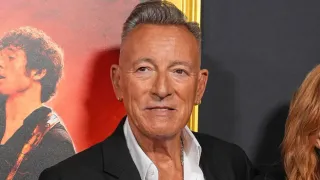July 30, 2016
Irish Lives Recounted in Book About Marriage Fight
Brian Bromberger READ TIME: 5 MIN.
For Charlie Bird, a straight man with a distinguished career in broadcasting, involvement with the LGBT community started 30 years ago when he worked with a gay man who was struggling to come out. This was during a dark time in Ireland when homosexuality was criminalized, so revealing one was gay could result in going to jail.
"I could see every day he was agonizing over being gay and as I was writing this book, that man and his torment was at the back of my head," said Bird, who has written "A Day in May: Real Lives, True Stories," that recounts last year's stunning referendum vote in favor of same-sex marriage in Ireland.
Bird, 66, is one of Ireland's best-known journalists, having been chief news reporter, chief news correspondent, and Washington correspondent for RTE, the largest, most popular news source in Ireland. In April 2015 he chaired the launch of the "Yes, Equality" marriage referendum campaign, and on May 23, 2015 the country became the first nation in the world to approve marriage equality by popular vote.
Having traveled throughout the country during that extraordinary campaign, he met people potentially affected by the referendum results, both gay and straight, and decided to bring to life their poignant struggles dealing with inequality and oppression. The book is a series of often heartbreaking, mostly randomly chosen interviews, as gay novelist Colm Toibin wrote in his forward, "that make clear being gay in Ireland was perhaps a more essential aspect of Irish history and Irish reality than anyone was aware."
Bird spoke with the Bay Area Reporter in a recent phone conversation from his Dublin home.
"For me what was so remarkable was ordinary people coming out to vote, especially the families of LGBT people," Bird said. "I had to record what happened to them. Most of the people in the book had never been publicly interviewed before, expressing such a wide range of emotions. Some of my best friends are now people I met this past year during this incredible journey."
A few of the interviews affected him deeply. Enda Morgan, formerly a banker and now a wedding band musician, has a lesbian daughter Rachel, who when she revealed to him she was gay, was shaking and crying uncontrollably, having bottled it up for years before speaking to him.
"She was living a double life, suffering severe anxiety," Bird said. "Once she told her parents, her panic attacks disappeared. When I heard her story, as a father myself, it made me cry."
Then there was Adam Hannon, living in rural Ireland, who brought his boyfriend to his Debs (the Irish version of a prom) in high school, "in the only county in Ireland to vote no. That took enormous courage, which impressed supporters in Dublin," Bird said.
Little rancor
What amazed Bird was how little rancor there was during the campaign.
"Perhaps Ireland had matured, after bruising battles years ago on legalizing divorce and decriminalizing homosexuality," Bird said. "There was no confrontation, even on TV, no vicious insults, no fighting or shouting people down. I think people realized that everyone knows someone who is LGBT so their right to marry was very personal to them.
"All the main political parties supported Yes, as did President Michael Higgins and former President Mary McAleese," Bird added. "The Home to Vote campaign, which was huge on social media, motivated young people who had emigrated to come back to Ireland and vote yes."
Not surprisingly, the Roman Catholic Church was the chief opponent in the referendum. But even that opposition was enough to deter same-sex marriage supporters; the vote was a lopsided 62 to 37 percent.
"The church doesn't have as much influence as it once did. Many of their schools are now multi-faith and their hold on the educational system is declining," said Bird. "Mass attendance is greatly down and the number of priests has declined, with few young people going to church. The sex abuse scandals may have blunted their impact and made it hard for them to talk about this issue. A number of priests even spoke out publicly in favor of the referendum."
Despite the stunning result, death by suicide among LGBT youth, as they struggle with their sexuality, is still a huge problem in Ireland, he said.
"Our former President Mary McAleese [she has a gay son] conducted a study on the Irish LGBT community which showed that suicide is increasing among young gay men, the most at-risk group, at a horrific rate, in spite of the referendum," Bird said. "There hasn't been enough work done in schools to educate kids on this issue. Six or seven people profiled in the book told me they had thought about ending their lives at one point or another."
One interviewee, Kathleen Sharkey - who talked about her gay brother, Anton, who died by suicide because he couldn't cope any more with his life - suffered another tragedy when, the day after the mass shooting in Orlando, Florida, her gay 22-year-old son, James, was "homophobically bullied and then took his own life," Bird said.
"Those people who bullied him are as culpable as that killer in Orlando," said Bird. "Bullying is a tremendous problem here with prejudice ingrained. That is why I want this book to be read in every school in Ireland, so students can identify with people in these stories and hopefully come out safely. That is also why I'm giving all the royalties from the book to groups dedicated to suicide awareness."
Bird claims there has been no backlash in the year since the referendum.
"People are bursting with pride over the result. We've all become more educated," he said. "Gay couples say it is easier to walk down the streets holding hands, even in rural areas. I have met people who voted no and now say they regret it."
Bird said that more than 60,000 people took part in this year's Dublin Pride parade.
"A few years ago, they would have struggled to get even several hundred to watch it," he said. "Hundreds of couples have gotten married and I've attended two weddings myself. LGBT people are coming to Ireland from other countries because they feel it is a safe place. Activists from around the world who want to legalize same-sex marriage are coming here to find out how we did it and get advice from us."
The book is selling well in Ireland, even after three major publishers turned it down, saying it wasn't commercially viable, said Bird, who added that a play based on the campaign and the book will come out early next year.
"A Day in May: Real Lives, True Stories" is available at http://www.amazon.com or check local booksellers






